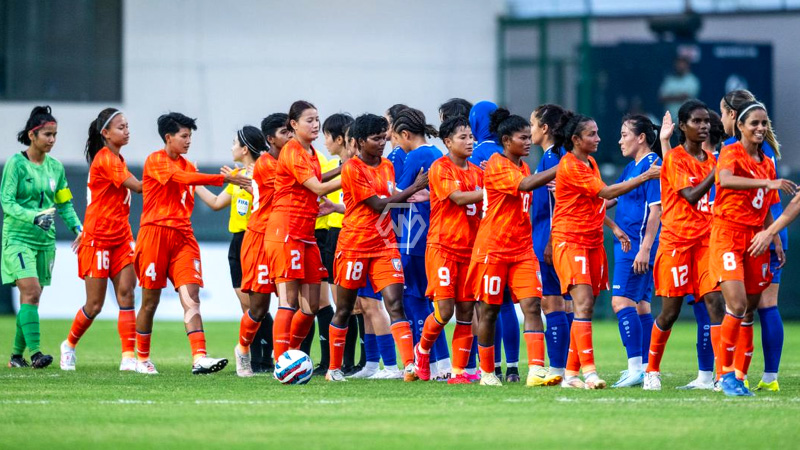- India to face Mongolia, Timor Leste, Iraq, and Thailand in Group B.
- Final 23-player squad to be confirmed before June 23 opener.
- Six-week Bengaluru camp included two close friendlies vs. Uzbekistan.
India’s senior women’s football team, led by head coach Crispin Chettri, is set to compete in the AFC Women’s Asian Cup 2026 Qualifiers in Thailand.
Placed in Group B, the Blue Tigresses aim to top the table to secure direct qualification to the 2026 Asian Cup in Australia — a gateway to the FIFA Women’s World Cup 2027. They will arrive early in Chiang Mai to acclimatize and adapt to the humid conditions.
Blue Tigresses Aim High in AFC Asian Cup Qualifiers After Intense Preparations
The squad’s training camp in Bengaluru served as an intensive preparation period, leveraging top-tier facilities at the Padukone-Dravid Centre. Despite suffering two narrow 0–1 losses to Uzbekistan, the team used the matches to test combinations and debut new talent.
Crispin Chettri emphasized the importance of squad balance and player management during the qualifiers. With injuries ruling out key forwards like Karishma, Sandhiya, and Renu, the coach opted for experience and resilience in his selection strategy.
India’s schedule includes a week of training in Chiang Mai to cope with the weather before facing Mongolia, followed by games against Timor Leste, Iraq, and hosts Thailand. The team will benefit from rest days built into the fixture calendar, allowing for strategic recovery.
The AFC Women’s Asian Cup not only provides continental glory but also a chance at global recognition through the FIFA World Cup 2027 qualification. India’s progress will depend heavily on improving attacking efficiency and maintaining squad fitness through the tournament stretch.
With preparations behind them and a clear goal ahead, the Blue Tigresses will look to capitalize on their training and experience as they embark on their qualifying journey in Thailand.
“We created many more chances in the second game as compared to the first, but the conversion was the problem, and that’s what we’ll work on in the coming days.” — Crispin Chettri



